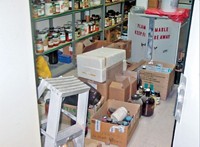Advertisement
Grab your lab coat. Let's get started
Welcome!
Welcome!
Create an account below to get 6 C&EN articles per month, receive newsletters and more - all free.
It seems this is your first time logging in online. Please enter the following information to continue.
As an ACS member you automatically get access to this site. All we need is few more details to create your reading experience.
Not you? Sign in with a different account.
Not you? Sign in with a different account.
ERROR 1
ERROR 1
ERROR 2
ERROR 2
ERROR 2
ERROR 2
ERROR 2
Password and Confirm password must match.
If you have an ACS member number, please enter it here so we can link this account to your membership. (optional)
ERROR 2
ACS values your privacy. By submitting your information, you are gaining access to C&EN and subscribing to our weekly newsletter. We use the information you provide to make your reading experience better, and we will never sell your data to third party members.
Safety
Safeguarding Foreign Labs
State Department program raises awareness about lab safety and security in developing countries
by Linda Wang
December 7, 2009
| A version of this story appeared in
Volume 87, Issue 49

When chemicals get into the wrong hands, it can wreak havoc. One of the more notable cases of chemical terrorism is the 1995 sarin nerve gas attack on a Tokyo subway, an episode that killed 12 people and injured thousands more. More recently, insurgents have used deadly chlorine gas in truck bombings in Iraq.
Because of a lack of attention to laboratory safety, many academic and industrial chemistry labs in developing countries could become targets for terrorists seeking access to unsecured chemicals. In August 2007, the U.S. State Department launched the Chemical Security Engagement Program (CSP) to help raise awareness about lab safety—and ultimately lab security—among chemical professionals in these countries.
The State Department hopes that by improving chemical safety and security in developing countries, the U.S. can strengthen its relationships overseas and also protect U.S. citizens traveling abroad. "Science is sometimes the best diplomacy we have," says Elizabeth E. Cameron, director of CSP in the State Department's Bureau of International Security & Nonproliferation. "By having scientists go with the State Department to talk to other scientists on the ground, we can create linkages that can help us enormously, not only with our nonproliferation goals but also with everything else that we work with other countries on, from safe drinking water and environmental issues all the way to security."
CSP complements the State Department's Biosecurity Engagement Program and its Partnership for Nuclear Security effort. "We looked across the U.S. government and realized that there were no equivalent efforts to engage scientists with chemical expertise," Cameron says. "As scientists, we have a responsibility to use the materials that we work with and the knowledge that we have in a responsible way."
Through seminars, training workshops, and other educational activities to support chemical professionals in developing countries, the program aims to foster "long-term relationships with the chemical community worldwide, hopefully resulting in better management of chemicals across the board," Cameron says. She notes that the program has engaged with 13 countries, and it plans to involve five more next year.
The workshops train participants in improving chemical safety and security best practices, laboratory management, identifying hazards in the lab, planning for emergencies, transporting chemicals safely and securely, and using smaller amounts of chemicals. So far, CSP has held roughly a dozen seminars and workshops in countries including Egypt, Indonesia, Iraq, Jordan, Malaysia, Morocco, the Philippines, Thailand, and United Arab Emirates.
Issues of lab safety and security are often neglected in the developing world. In the Philippines, for example, "there's very little proactive effort toward safety and security," says Patrick J. Y. Lim, chair of the chemistry department at the University of San Carlos, in Cebu City. "Many professors are hard-pressed for grant money, and more often than not, safety comes last."
In Pakistan, although eye protection and lab coats are required at the University of Karachi, there are many laboratories in the country "where there's absolutely no concern about it," says Muhammad Iqbal Choudhary, a professor of structural organic chemistry at the university and director of its International Center for Chemical & Biological Sciences. "People are not wearing eye protection, people are not wearing lab coats, and they're handling acids and bases and other chemicals," he adds.
Once scientists begin to improve their lab safety practices, better lab security will follow, Cameron contends. "Lab safety and lab security are related," she says. "If you have good laboratory management and safety practices, the security situation in your laboratory is going to get better."
Choudhary acknowledges that chemical security in Pakistan is a growing concern as the research infrastructure improves and more and more Ph.D. scientists return there to do research. "They will be procuring chemicals of a diverse nature, and there needs to be a system in place" to prevent terrorists from gaining access to the chemicals, he says.
The State Department is partnering with Sandia National Laboratories to aid in the implementation of the program. Sandia has played a major role in helping the program make connections with chemical professionals in the developing world. "The thing that has really struck me is how strongly chemists in the parts of the world that I've been to really would like to do something to be more environmentally responsible and to teach their students to be more environmentally responsible," says Nancy B. Jackson, manager of the Department of International Chemical Threat Reduction at Sandia, who is leading the national lab's efforts in the program. Jackson is the American Chemical Society's 2010 president-elect (C&EN, Nov. 23, page 7).
Most countries cite a lack of money as the biggest obstacle to improving lab safety. Douglas B. Walters, director of the nonprofit Environmental & Chemical Safety Educational Institute, who teaches some of the workshops on chemical safety and security, has been helping chemists in developing countries find low-cost alternatives to improving safety in their labs. "We try to give them universal good safety practices," he says. "It's then up to them to be creative and ingenious in how they apply them."
Walters recalls visiting a lab in a developing country and suggesting to the chemists there that they should put their flammable solvents in a metal storage cabinet rather than leave them out in the open. When the chemists told him they couldn't afford a metal cabinet, Walters suggested they build one out of hardwood, which doesn't burn easily. "You have a lot of hardwood here, and you've got a lot of craftsmen," Walters told them. "It takes a long time for the fire to burn through the wood to get to the chemicals, and that's what you want. You want to have extra time to evacuate the building."

Some countries are beginning to incorporate both small-scale and green chemistry into their undergraduate curricula to reduce exposure of both students and the environment to chemicals. In Thailand, for example, Supawan Tantayanon, an associate professor of chemistry at Chulalongkorn University, in Bangkok, has developed a laboratory kit that includes small-scale glassware and other equipment to do organic chemistry experiments using a fraction of the chemicals normally required. She demonstrated the kits during a workshop in Bangkok in October.
Countries that can't afford the kits might be inspired to come up with their own approach for reducing the amounts of chemicals needed for experiments and waste produced, Walters says. "Sometimes, just by putting the idea out there, you can get people thinking about it," he says. "They now know there are alternative ways of doing things, and that's the important part."
The program has an international network of collaborators, including scientific organizations such as ACS, the International Union of Pure & Applied Chemistry, the Federation of Asian Chemical Societies, the Federation of African Societies of Chemistry, the Arab Union of Chemists, and the American Chemistry Council.
Participants in the workshops can receive additional training to become chemical safety and security officers for their universities. "The idea is that scientists who are trained will then go back to their universities and serve as a focal point for efforts in their own university to promote good chemical safety and security practices," Cameron says. "This will hopefully become a self-propagating venture."
Chemists in the U.S. who want to help the program can offer their expertise as well. "As this program grows, the most important thing is that experts in the chemical community from the U.S. are able to participate in some of these activities in other countries," Cameron says.
It's an investment that's worth making, Choudhary says. "It is of interest to everyone to have safe and secure chemical laboratories because the world is a global village," he says. "These terrorist organizations have a global network, so anyplace in the world which is unsecured would make the rest of the world unsecured, too."




Join the conversation
Contact the reporter
Submit a Letter to the Editor for publication
Engage with us on Twitter